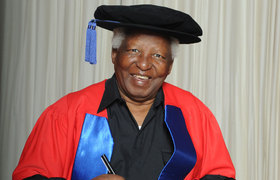Justice Yvonne Mokgoro (1950–2024)
09 May 2024 | Story Kamva Somdyala. Photo Je’nine May.
Democratic South Africa’s first black woman Constitutional Court Justice and 2018 recipient of a University of Cape Town (UCT) honorary doctorate Yvonne Mokgoro died on 9 May 2024.
Born on 19 October 1950, she suffered multiple injuries in a serious car crash near Kimberley in the Northern Cape in April last year. Several setbacks in her recovery forced her to step away from public engagements. She was an esteemed member of the Order of the Baobab and was honoured with a Special Official Funeral Category 1 by President Cyril Ramaphosa. A Special Official Funeral Category 1 includes ceremonial elements by the South African National Defence Force.
Mokgoro’s legacy is underpinned by the philosophy of realising human rights through the justice system.
During her legal career, she taught several law courses at universities in South Africa, the United States, the Netherlands and the United Kingdom. She was a member of the International Women’s Association (Washington DC), the International Association of Women Judges, the International Federation of Women Lawyers and the South African Women Lawyers Association. In 2006, she was selected as an icon of the history of Women Lawyers in South Africa.
Delivering the eulogy at her funeral on 23 May, President Ramaphosa said: “Her appointment to the Constitutional Court was the product of many years of both formal and self-study to better herself and to advance in her chosen profession.
“It was the fulfilment of a dream in which she never lost faith, even while working in a host of different jobs, as a nursing assistant, a retail salesperson and as a clerk. It was a progression from a successful career as a legal academic when she produced ground-breaking research on customary law. This all at a time when our jurisprudence and case law around this subject were still evolving.”
Her journey to the bench of the Constitutional Court began when she worked as a clerk in the Department of Justice of Bophuthatswana. She graduated from the University of Bophuthatswana with a BJuris (1982), and after the completion of her LLB in 1984 she was appointed maintenance officer and public prosecutor in the then Mmabatho magistrates’ court.
Highest of standards
She was subsequently awarded two LLMs, one from the University of Bophuthatswana in 1987 and one from the University of Pennsylvania in 1990.
Continuing with the eulogy, Ramaphosa noted, “She was an exceptional jurist who, alongside her peers on the Constitutional Court, set the highest of standards for the new democratic state. They are standards we will continuously strive to uphold, now and into the future.”
In 1998 Mokgoro ruled that the regulation precluding foreign citizens from being employed as teachers was unfair, and in 2004 she confirmed that the right to social security in the Constitution vests in everybody and that it was unreasonable and discriminatory to exclude permanent residents from social grants.
In 2000 she ruled that it is was not permissible for a bank to seize the property of defaulting debtors without a court order and later, in 2005, further cemented property rights when she declared that the sale in execution of a judgment debt of a person’s home without judicial oversight was unconstitutional.
Legal and educational institutions
Reacting to the news, Mbekezeli Benjamin from UCT’s department of public law praised Mokgoro’s principles of ubuntu in her judgments from the bench.
“Justice Mokgoro was a pioneer in the legal community throughout her remarkable career. Her journey from legal academia to being the first black woman judge in South Africa speaks to her pioneering spirit. But perhaps her greatest legacy is her infusing the African principle of ubuntu into mainstream South African law. Not only did it create a new jurisprudence, it also created a new branch of legal scholarship.
“Justice Mokgoro’s devotion to advancing the law and justice, her building of legal and educational institutions, and her support of children and the youth, are part of a legacy that will live with us for many years to come,” said Benjamin.
She is survived by five children, six grandchildren and two siblings.
 This work is licensed under a Creative Commons Attribution-NoDerivatives 4.0 International License.
This work is licensed under a Creative Commons Attribution-NoDerivatives 4.0 International License.
Please view the republishing articles page for more information.










